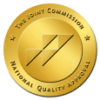Find a steady step between treatment and independent life with Sober Living. Our recovery residence in Tennessee offers a safe and structured environment with peer support, accountability, and easy access to local meetings and resources.
Choose a sober home in Tennessee that helps you practice daily recovery skills, rather than a halfway house model.
Understanding Sober Living in Tennessee
Sober living is a supportive housing model that gives you time and structure to build a stable routine in early recovery. In a typical sober living in Middle Tennessee, you live with peers who are also committed to sobriety.
You follow house expectations that keep the environment consistent and safe while you work, study, volunteer, attend meetings, and keep building the skills that support long-term wellness.
Unlike a halfway house in Tennessee approach, sober living is a voluntary choice that centers on personal responsibility, community, and daily accountability.
Structure is the backbone of effective sober homes in Tennessee.
- You can expect clear daily routines such as morning check-ins, evening quiet hours, and set times for chores and house meetings. Curfews help anchor sleep and reduce late-night triggers.
- Random substance screening and check-ins with house leadership reinforce accountability in a consistent and respectful way.
- Schedules encourage regular meals, movement, and time for meetings or therapy so you can rebuild energy and focus.
This level of structured sober living keeps decision fatigue low and makes it easier to repeat healthy choices until they become habits.
Over time, the rhythm of the house supports your own personal rhythm so you can return to school or work with confidence.
Recovery grows stronger in the community. In peer support sober living, you share a home with people who understand what early recovery feels like. House meetings create a place to check progress, ask for help, and celebrate wins. You will learn how to be a good housemate, how to repair after conflict, and how to set healthy boundaries.
Many clients connect with sponsors and attend nearby meetings together, which lowers the barrier to showing up on hard days. Informal support can be just as powerful as formal support. A ride to a meeting, a reminder to eat, or a quick talk on the porch can turn a tough evening into a manageable one.
This daily practice of giving and receiving help is what transforms a group of residents into a recovery residence community.
The home itself is set up to reduce risk and support progress.
- A drug and alcohol free standard is non-negotiable and is backed by testing that is fair and consistent for everyone.
- Clear guest policies and technology guidelines protect privacy and focus.
- Kitchens are stocked for simple meal prep, and common areas are kept calm so you have spaces for study, meetings, or quiet reflection.
- Safety practices include regular walkthroughs, secure storage for medications, and straightforward reporting for any concerns.
- Transportation planning is part of the environment, too. You will map routes to workplaces, schools, and meetings, and you will know your options for rideshare or bus lines.
When the basics are predictable, you can put more energy into personal goals and skill-building.
Sober living in Tennessee works best as part of a step-down plan. Many people arrive after inpatient or outpatient care and continue with therapy, medication support when appropriate, and peer meetings while they live in the home.
The house provides stability as you practice real-world routines, manage cravings, and grow confidence. You get time to find a job, register for classes, or reconnect with family while still having the structure that helps prevent relapse.
When you are ready to transition to independent housing, you will have rhythms, relationships, and tools that travel with you.
The Importance of Sober Living in Tennessee
Those first weeks out of treatment can feel wobbly. You have new insight and motivation, but real life still brings busy mornings, tough emails, and familiar triggers. Sober living in Middle Tennessee gives you a steady bridge between structured care and full independence.
You wake up to a routine, lean on people who get it, and practice the basics of work, school, and home without losing your footing. That is the heart of relapse prevention housing. It offers time, structure, and community so the healthy choices you made in treatment become the habits you carry every day.
Stability and Routine that Lower Relapse Risk
Relapse risk rises when days feel chaotic. Stability lowers that risk.
In a well-run home, you wake up at a consistent time, complete simple morning tasks, check your plan for the day, and follow a clear evening wind-down. Curfews support sleep hygiene so your brain and body can recover.
House meetings and regular chores anchor the week. This predictable cadence reduces decision fatigue and makes room for the basics that keep you well. You eat regular meals. You move your body. You get to a meeting.
When life is predictable, you can see urges sooner and use skills before problems grow. That is the quiet power of routine.
Built-In Accountability
Accountability is not punishment. It is support you can count on. Random testing confirms that everyone in the home is living by the same standard. Curfews and scheduled check-ins create natural moments to talk about stress, cravings, and plans for the next day.
If you are struggling, house leadership can adjust your schedule, increase support, or help you reconnect with clinical care. Clear expectations remove guesswork and reduce conflict.
Everyone knows what safe behavior looks like and what happens when something goes off track. The result is a calm environment where residents can focus on growth. This is the foundation that makes relapse prevention housing effective.
Local Recovery Access
Location matters. In 12-step sober living in Tennessee, you are surrounded by a dense network of meetings, sponsors, and peer groups.
If you prefer a different pathway, you can find alternatives and therapy providers within a short drive. Outpatient services are close by. Employers and schools are within reach. This is what people mean when they talk about transitional housing in Tennessee. It’s housing that connects you to a living recovery ecosystem.
You can leave the house for a meeting, stop at the gym, go to work, and get home in time for a quiet evening. Recovery fits into a real schedule, not an ideal schedule.
Life Skills and Independence
Recovery is not only about abstinence. It’s also about life skills. In sober living in Middle Tennessee, you practice the habits that make independent housing realistic.
You budget for groceries and transportation. You meal plan and cook simple food that supports energy and mood. You learn to share space, give feedback, and repair after conflict. You keep a calendar and arrive on time.
Transportation planning becomes a weekly task. You map bus routes, organize rides, or plan for car share.
These skills are small on paper and very large in daily life. Each one builds confidence. Each one lowers stress. Together, they help you hold a job or return to school while protecting your recovery.
Why This Step Matters After Rehab —
Treatment gives you tools. Sober living gives you time to use them in the real world. You continue therapy if needed, keep medication plans on track, and show up for meetings with housemates who understand the ups and downs of early recovery.
You experience stressful days, and you also experience yourself handling them. This is how confidence grows. When you do move into independent housing, you are not starting over. You are continuing a routine that already works.
Sober Living vs. Halfway House:
Choosing the right housing after treatment affects daily stability, accountability, and long-term progress. In Tennessee, people often hear two terms that sound similar but feel very different in practice.
Sober living in Tennessee is usually described as a recovery residence environment that is voluntary, community-oriented, and focused on building real-life routines.
A halfway house model approach can be connected to the justice system and may follow rules that come from court orders or corrections. Understanding the distinctions helps you choose the setting that fits your needs, goals, and level of structure.
Is Sober Living Right for You?
Kratom often rides on habit loops: cue → thought → dose → short relief. CBT helps you map that loop in detail and choose a different response before the automatic response kicks in.
- Habit loops & triggers: You’ll identify the exact windows that set you off (morning grogginess, post-work letdown, late-night worry) and the thoughts that justify dosing (“I won’t sleep without it,” “I deserve a break”).
- Cognitive restructuring: Together with your therapist, you’ll test those thoughts against evidence and replace them with workable statements that keep you moving (“My sleep protocol helps 8 nights out of 10; if it’s rough tonight, I’ll still be okay tomorrow”).
- Sleep protocol: CBT integrates a concrete wind-down (timed light exposure, caffeine cutoff, stimulus control, relaxation sequence) so your nervous system learns to settle without kratom.
- Relapse prevention plans: You’ll script how to handle high-risk days like travel, exams, conflict and keep a one-page plan on your phone.
Culture shapes daily life. A recovery residence in Tennessee is designed to feel like a home where peers encourage each other, share routines, and practice the skills that support recovery.
House leaders create a respectful environment with fair and consistent standards. Meetings, chores, quiet hours, and check-ins build rhythm and trust. In contrast, some halfway houses operate with an institutional feel. The focus can tilt toward security procedures and rule enforcement.
For some people, this is the right level of oversight. Others do better in a peer-led environment where support, dignity, and shared responsibility are at the center. Consider which tone will help you speak up when you struggle and keep showing up for your plan.
Sober living works best when you have enough time to stabilize your schedule and practice skills in the real world. Many residents stay long enough to build consistent routines for work, school, meetings, and self-care.
The timeline is flexible and guided by progress markers such as reliable attendance, steady employment, and improved coping. You can plan a gradual step down that moves from more structure to less structure as you are ready.
In a halfway house Tennessee model, the length of stay may be defined by legal timelines or program milestones that are less personalized. Transitional housing in Tennessee that follows a sober living model usually allows you to collaborate on your exit plan so that housing changes match your growth rather than an external clock.
Financial details matter, and they differ by model. Many sober living homes function as self-pay housing with transparent monthly fees that cover the room, utilities, and house operations. If you are also enrolled in outpatient services, your clinical care may be billed to insurance separately by those providers.
Some Tennessee recovery residence programs offer tiered pricing that reflects room type and amenities. Halfway houses can be publicly funded, grant-supported, or fee-based, depending on the agency that runs them.
Ask for a written breakdown of costs, deposits, refund policies, and what is included, such as testing, transportation support, or basic household supplies. Clarify how payment works if you start a job or enroll in school.
A clear financial picture reduces stress and helps you focus on recovery.
If you want a home where you opt in to structure, live with motivated peers, and use daily routines to lower relapse risk, sober living in Tennessee offers that environment. If your priority is meeting a legal condition or you have been assigned to a program by the court, a halfway house in Tennessee may be the appropriate setting.
Transitional housing in Tennessee can include both models, which is why asking detailed questions is important. Tour if possible. Meet the staff. Read the house standards. Picture yourself coming home from work or a meeting, and consider which tone will help you keep your commitments on a hard day.
The right choice is the one that supports safety, consistency, and steady progress in your real life.
Why Choose our Sober Living in Tennessee?
Sober living is a practical next step for people who want structure, community, and a clear routine while they return to daily life. The homes provide accountability, quiet stability, and real-world practice with skills that protect recovery. If you are considering sober living in Middle Tennessee or sober living in Murfreesboro, this guide will help you decide whether the timing and setting fit your needs today.
Ideal Candidates
Sober living is a strong fit after you complete a higher level of care and want time to stabilize in a safe setting. It is especially helpful in early recovery when routines are not yet automatic and triggers can feel unpredictable.
Many Tennessee residents choose the home to extend relapse prevention by keeping curfews, meetings, and regular testing while they return to work or school. People with co-occurring mental health needs often do well here when they also continue outpatient therapy and medication management with licensed providers.
The peer support sober living model is a key benefit. You live with people who are working toward similar goals, share realistic strategies, and understand both the challenges and the wins that arrive in the first months after treatment.
When to Stabilize First
Sometimes, the best first step is medical stabilization before entering a house. If you are actively using, experiencing severe withdrawal symptoms, or have health risks that require medical monitoring, detox or inpatient treatment should come first.
Stabilization is also important if you are struggling to complete basic daily tasks like personal care, eating, or sleeping through the night. The same is true if you are in an acute mental health crisis or need rapid medication changes.
Sober living works best when you arrive able to participate in a routine, attend meetings, complete simple chores, and follow house guidelines. Entering once you are medically and emotionally safer protects you and the rest of the home and sets you up for a steady start.
How We Coordinate Care
Tennessee Detox Center helps you build a plan that fits your current place in recovery. The team reviews your recent treatment history, current medications, and support needs. Together, you identify the right next steps so that housing aligns with care.
If you’re ready for sober living, you receive clear house standards, a move-in checklist, and help organize a weekly schedule that includes meetings, therapy, work or school, and rest. If you need more stabilization, the team can discuss appropriate levels of care and trusted referrals so you are not navigating this decision alone.
The goal is a smooth transition that protects your momentum and keeps support within reach.
Our Sober living houses in Tennessee are designed to feel like home while still providing the accountability that keeps recovery on track. You can expect a calm environment, respectful leadership, and peers who practice daily recovery skills.
If you are motivated to maintain sobriety, able to follow structure, and ready to keep showing up for meetings and life responsibilities, sober living can be the right setting. If you are unsure whether you need a higher level of care first, start with a straightforward conversation about symptoms, safety, and support.
The right timing is the one that helps you heal, protects your progress, and makes your next step feel doable.
Why Choose Tennessee Detox Center’s Sober Living
Choosing a home for early recovery is about more than a bed. It is about safety, structure, and a culture that respects you while helping you keep your commitments.
Tennessee Detox Center operates a recovery residence that Middle Tennessee clients can trust. The homes blend experienced guidance with a calm, comfortable environment so you can practice real-life routines and protect your progress.
This is structured sober living that feels supportive and human.
- Experienced Clinical Team and 24/7 Supervision or On-Call Support
Care begins with people who understand early recovery. At intake, a clinical team reviews your history, current needs, and goals so the plan fits where you are today. House managers set the tone in daily life and are trained to support accountability with respect.
Supervision and on-call support mean you are not alone when questions come up after hours or when a stressful moment arrives. If you need help adjusting a routine, finding a meeting, or coordinating with a therapist, someone can guide you.
This steady presence creates confidence, which is essential in the first months at sober homes in Tennessee.
- Structured Sober Living With Clear House Rules
Structure reduces stress. Every resident receives clear house standards that cover curfews, meeting attendance, chores, visitor policies, technology guidelines, and random testing. Rules are explained in plain language, so expectations are easy to follow. Daily life has a predictable rhythm with morning check-ins, evening quiet hours, and weekly house meetings.
This level of structured sober living keeps the environment consistent for everyone and lowers the risk of conflict. It also helps you focus on the basics that matter most. You sleep regular hours, plan meals, schedule meetings, and keep work or school on track.
When the framework is clear, energy can go to building skills rather than managing uncertainty.
- Holistic and Evidence-Based Support
Recovery is stronger when care works together. Residents are encouraged to continue therapy and, when appropriate, medication management through trusted outpatient partners.
Cognitive Behavioral Therapy, Dialectical Behavior Therapy, and Eye Movement Desensitization and Reprocessing are common approaches that fit well with the routines of the house.
Practical skills such as craving management, emotional regulation, and grounding techniques are practiced in the context of daily life. If you choose 12-step participation, the team helps you connect with 12-step sober living Nashville resources and meeting options at times that fit your schedule.
If you prefer an alternative pathway, the same coordination applies. The goal is a plan that matches your needs and respects your preferences.
- Community, Dignity, and Privacy
The right house feels like a real home. From day one, you’re greeted by people who say hello, save you a seat, and mean it. Courtesy and looking out for each other are the norm, not the exception.
House meetings are calm spaces to check in, set goals, name what’s hard, and celebrate what went well. When tough conversations need to happen, they’re handled with care so repairs are quick and trust keeps growing.
Privacy matters here, too. Your room is your space. Medications are stored securely. Quiet hours make sleep predictable. You know the boundaries, and you know they’ll be respected.
Put it all together, and you get a place where you can practice new habits without walking on eggshells and speak up before small problems get big. That steady mix of community and privacy is the hallmark of a recovery residence that Tennessee residents can count on.
- Luxury Sober Living Options in Tennessee
Comfort supports consistency. Tennessee Detox Center offers luxury sober living options for clients who want an upgraded environment while keeping the same standards of safety and accountability.
These homes may feature private or semi-private rooms, quality bedding, modern kitchens, and thoughtfully furnished common areas. Outdoor spaces provide quiet places to read, reflect, or connect with housemates after a meeting or work shift.
A clean and comfortable setting makes it easier to cook simple meals, keep a tidy schedule, and maintain a calm mindset.
Luxury is not about excess. It is about creating a space that removes friction so daily recovery routines are easier to repeat.
- Transportation and Local Access
Location matters in early recovery. Homes are positioned with access to employment centers, education, fitness, and a full range of recovery meetings. Residents map out transportation for work, school, therapy, and peer support so that travel does not become a barrier.
Plans may include bus routes, rideshare, car share, or carpooling with housemates. In Tennessee, and Murfreesboro, Tennessee, there are morning and evening options for meetings, including 12-step and alternative groups, which means you can keep a recovery routine even with a changing work schedule.
When logistics are simple, it is much easier to show up consistently, and consistency is what builds confidence.
What Sets Tennessee Detox Center Apart
Tennessee Detox Center pairs human warmth with professional standards. The team understands that you need both accountability and encouragement. The houses run on clear rules and fair enforcement, yet never forget that each person is more than a rule sheet.
Residents learn to manage stress in practical ways, from planning meals and sleep to scheduling meetings and movement. You will find a calm environment, a respectful culture, and a plan that adapts as you grow. For many people, that combination is exactly what makes the difference in early recovery.
If you want a home that blends structure with comfort, connects you to local care, and supports daily routines that actually work, Tennessee Detox Center’s sober living is a strong fit. It is a place to practice independence with support and to turn new skills into reliable habits.
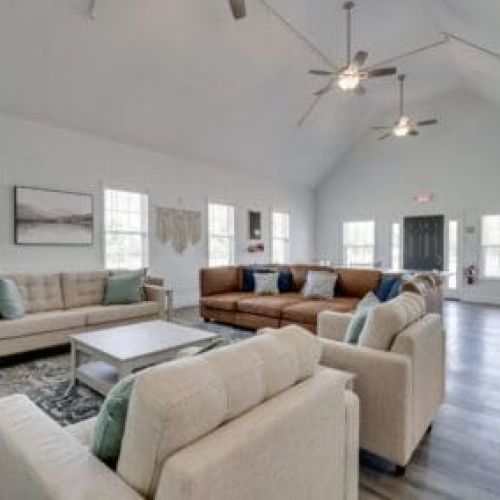
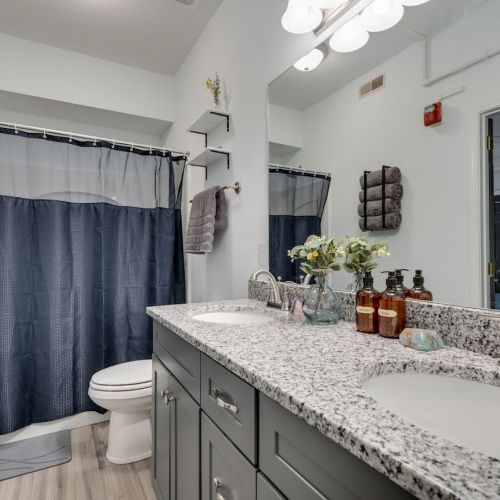

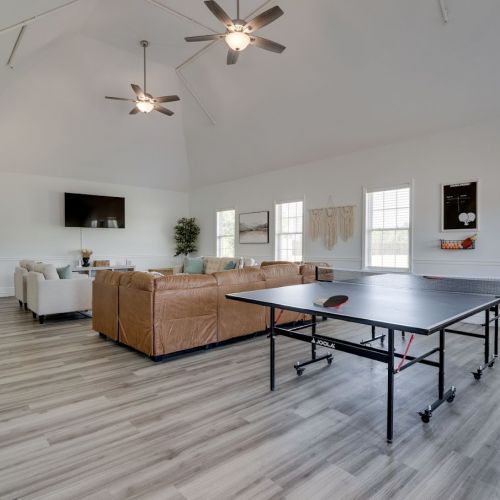




A Clear Path: Detox → Rehab → Outpatient → Sober Living → Aftercare
Recovery is easier to hold when the next step is clear. A strong continuum of care gives you a straightforward path from medical stabilization to daily life with support. Each level has a purpose. Together, they reduce risk, build skills, and prepare you for independence with a plan that lasts.
What to Expect During Sober Living in Tennessee?
The heart of structured sober living is a calm rhythm you can count on. Mornings start at a consistent time. You glance at your plan, make your bed, eat something simple, and take a breath before the day gets moving. There is space for work or class, a little movement, a meeting or check-in, and a real wind-down at night. Nothing fancy. Just the basics, repeated until they feel natural.
Meals are predictable, not perfect. A short walk counts. Quiet hours help your mind settle so sleep has a chance to do its job. The predictability lowers stress and makes cravings easier to handle. When tough moments pop up, you already know who to call and where to go.
In a peer support sober living house, the culture does a lot of the lifting. People ask how you are and stick around for the answer. House meetings are steady places to set goals, troubleshoot something that went sideways, and celebrate small wins. You learn to speak up early and repair quickly.
Over time, the routine, the people, and the clear structure work together to keep you steady while the rest of life gets back on track.
Curfews support healthy sleep and create a reliable evening wind-down. When you know what time you are expected home, it becomes easier to plan meetings, work shifts, and errands without rushing.
House meetings happen on a regular schedule and give everyone a chance to share updates, review expectations, and discuss any concerns. Chores are clear and fairly divided, so common areas stay clean and welcoming.
Random testing is part of the safety net. It keeps the environment sober and consistent for everyone and removes guesswork about expectations.
These standards are explained in plain language at move-in and are applied with respect. The result is a steady atmosphere where the rules support growth rather than distract from it.
You will set weekly goals that align with your stage of recovery. Many residents start with a simple foundation, such as three meetings, regular meals, and a consistent bedtime.
As stability grows, you add goals for work applications, class registration, or volunteering. Calendars and checklists help you break goals into small steps that can be completed in a normal day.
You might map out two job applications before lunch, a meeting after work, and time to prepare a basic dinner. Regular check-ins with house leadership or peer mentors provide accountability and problem-solving. If a plan is too heavy for the week, you scale it back. If a plan is too light, you add a challenge.
This approach builds confidence and keeps progress visible.
You will have access to a wide range of recovery meetings in Tennessee, and Murfreesboro, Tennessee. Many residents choose 12-step sober living in Tennessee because the meeting density makes daily attendance possible even with a changing work schedule.
Morning, lunch, and evening options allow you to keep a steady routine. If you prefer an alternative pathway, there are other community groups that emphasize skills practice, mindfulness, or cognitive strategies. You will be encouraged to try different formats until you find meetings that feel like a good fit.
Attending with housemates lowers the barrier to entry and makes it easier to keep showing up on hard days. Sponsors or peer mentors can help you work through steps or structured plans, and you can bring questions back to the house meeting for additional support.
Getting around should be simple. From the start, you map out how to reach work, school, and meetings so there are no last-minute scrambles. You learn the nearby bus routes and the common transfers that connect the house to campuses, job sites, and recovery spots.
If you use rideshare, you will know the house guidelines for booking, splitting costs, and waiting in safe pickup areas. When schedules line up, carpooling with housemates cuts expenses and adds a little community to the day.
Safety is bigger than transportation. Kitchens are set up for easy meal prep with clear spots for your food and tools. Common areas have quiet hours so everyone can count on real rest. Personal items and medications have secure storage, and guest policies are straightforward, so visits feel welcome and the house stays calm.
If something does not feel right, there is a simple way to speak up and a predictable response from staff. Problems get addressed quickly and respectfully, which keeps the environment steady and lets you focus on your plan.
A typical weekday might start with a quiet morning routine, a brief check of your calendar, and time for breakfast before heading to work or class. Midday, you take a short walk or practice a grounding skill you learned in therapy. After work, you attend a meeting with a housemate, share a simple dinner, and spend a few minutes on job applications or schoolwork.
You complete your chore, check in about the next day, and begin winding down well before curfew. Weekends leave room for errands, exercise, family contact when appropriate, and a bit of rest.
Over time, this steady pattern turns new skills into habits. That is the promise of structured sober living. It doesn’t remove the challenges of early recovery. It gives you a practical way to meet them and keep moving forward.
Relapse Prevention at Sober Living in Tennessee
Middle Tennessee offers the right mix of structure, community, and opportunity. The area is large enough to provide choice and small enough to feel connected. People who choose sober living in Tennessee or sober living in Murfreesboro benefit from strong meeting networks, steady job markets, and access to parks and fitness spaces that support daily routines. Transitional housing in Tennessee works best when recovery can fit into normal life.




Family Education and Updates with Client Consent
Education lowers fear and confusion. Families benefit from learning the basics of substance use disorders, the structure of sober living, and the skills residents are practicing at home. With the resident’s signed consent, staff can provide appropriate updates and answer practical questions.
Conversations focus on safety, routine, and next steps rather than details that don’t serve recovery. When everyone understands roles and expectations, home visits and phone calls become calmer and more supportive.
How Families Can Support Without Enabling
Support means offering empathy, encouragement, and accountability while avoiding patterns that remove natural consequences. Helpful steps include respecting curfews, encouraging meeting attendance, and praising small wins like steady sleep or on-time shifts.
Unhelpful patterns include rescuing from every stressor, negotiating house rules, or minimizing warning signs. Families can practice simple scripts for tough moments, such as suggesting a meeting, contacting a sponsor, or revisiting coping plans.
When support is clear and consistent, residents feel trusted and motivated to keep doing the work.
Step Down Planning with Loved Ones
Transitions are easier when they are planned together. As residents progress, families can be part of conversations about employment, school schedules, budgeting, and future housing goals.
The focus is on concrete steps such as saving a set amount each month, keeping three reliable meetings per week, and identifying early warning signs with a clear response plan. Loved ones can help build a simple calendar for appointments and check-ins.
They can also offer practical help like rides to interviews or time for apartment searches, while still honoring the resident’s responsibility for follow-through.
This kind of partnership builds confidence and keeps everyone aligned on what success looks like in the next season.
Start Sober Living at Tennessee Detox Center
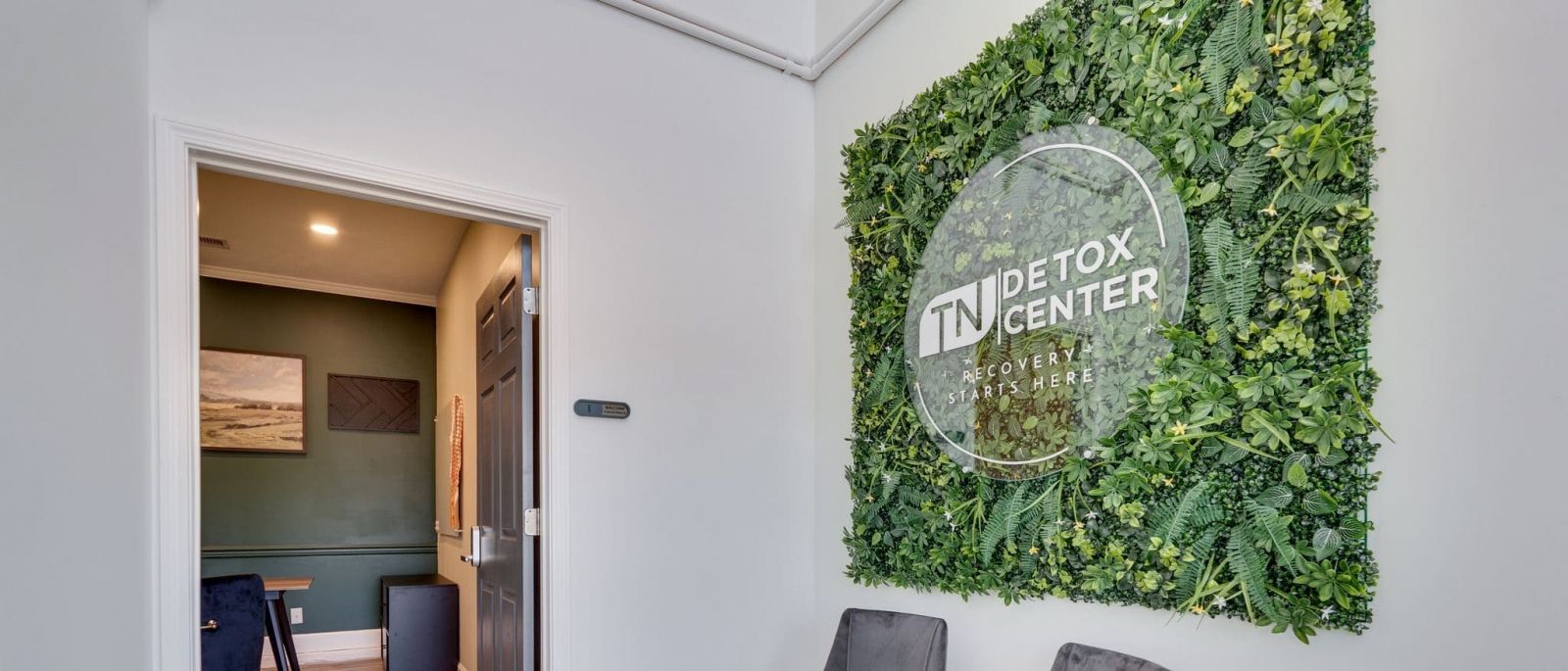
You don’t have to figure this out on your own. A confidential call will help you understand options, confirm readiness, and plan a start that feels calm and manageable.
Same-day assessments are available when space and staffing allow. Benefit verification is fast, pricing is transparent, and the first week is mapped so you know exactly what to expect.
You will have a clear plan for meetings, meals, sleep, and transportation before you arrive. We will map the right starting level, whether that is detox, residential, outpatient, or sober living and schedule your first 72 hours so you can settle in and focus on progress.
FAQs about Sober Living in Tennessee
Sober living is a voluntary recovery residence Tennessee residents choose when they want structure, accountability, and a substance-free home. A halfway house in TN is often connected to the justice system and may be part of a court requirement. Sober living focuses on daily routines, community support, and step-down planning. Halfway houses may emphasize compliance with legal conditions. If you want a home culture built around motivation and peer support, sober living in Tennessee is usually the better fit.
Length of stay is guided by progress, not a fixed calendar date. Many residents stay long enough to build steady routines for sleep, meetings, work or school, and self-care. Common markers include consistent attendance, negative tests, a workable budget, and reliable transportation. When these pieces hold for several weeks, step-down planning begins. In sober living in Murfreesboro and across Middle Tennessee, timelines are personalized so you transition when you’re ready.
Rules are clear and consistent, so the home remains predictable for everyone. Curfews protect sleep and reduce late-night triggers. House meetings cover updates, goals, and conflict repair. Random substance testing keeps the environment safe and prevents confusion about expectations. Chores and guest policies are explained at move-in. This level of structured sober living reduces stress and gives you a simple framework to follow while you work on your goals.
Yes. Residents can access a dense network of AA and NA meetings at different times of the day, which makes it easier to keep a regular schedule. If you prefer a different pathway, there are skills-based and mindfulness-oriented groups in the area. The aim is to help you find meetings that match your needs and values. Many residents try a few formats before landing on a routine that feels right for them, which is common in 12-step sober living in Tennessee.
Most sober homes in Tennessee use a self-pay model for housing, which covers the room, utilities, and shared household operations. If you also attend outpatient therapy or medication management, those clinical services are typically billed separately by the provider and may involve insurance. You will receive a written breakdown of fees, deposits, due dates, and what is included, such as testing and basic supplies. Transparent pricing helps you plan and keeps financial stress lower.
treatment, but details vary. Our team can Verify Insurance quickly, confirm covered levels (Residential/PHP/IOP/OP), and review deductibles, coinsurance, and any pre-authorization. You’ll get a clear estimate before you start, so financial decisions aren’t guesswork.
Yes. Schedules are designed to support steady employment and education. You will map out weekly goals, build a transportation plan, and protect time for meals, meetings, and rest. If you are between jobs, staff can guide you toward local resources for applications and interviews. Students can organize class schedules, study blocks, and meeting times. The purpose of transitional housing in Tennessee is to help you practice real-life responsibilities with a safety net.
Residents create a simple transportation plan during orientation. Options can include bus routes, rideshare, car share, and carpooling with housemates when schedules align. Homes are positioned with access to meeting locations, employment centers, and clinics. The goal is predictability. When travel is planned in advance, it becomes much easier to keep commitments. Reliable transportation is a key part of relapse prevention and a daily skill that grows over time.
Addiction Group. (n.d.). Tennessee drug and alcohol statistics. Retrieved July 28, 2025, from https://www.addictiongroup.org/tennessee/drug-statistics/
Substance Abuse and Mental Health Services Administration (SAMHSA). (2023). 2023 ICCPUD state report: Underage drinking prevention – Tennessee. U.S. Department of Health and Human Services. Retrieved from https://library.samhsa.gov/sites/default/files/tennessee-iccpud-state-report-2023.pdf
Tennessee Alcoholic Beverage Commission. (2024). Report to prevent underage drinking, drunk driving, and other harmful uses of alcohol (PC 961). State of Tennessee. Retrieved from https://www.tn.gov/content/dam/tn/abc-documents/abc-documents/PC-961-2024-Report-to-Prevent-Underage-Drinking-Drunk-driving-and-Other-Harmful-Uses-of-Alcohol.pdf
National Institute on Alcohol Abuse and Alcoholism (NIAAA). (2012). Alcohol withdrawal syndrome. In S. C. Merrill & B. S. Frances (Eds.), The management of alcohol use disorders: A practical guide for clinicians (NIH Publication No. 12–5191). National Center for Biotechnology Information. Retrieved from https://www.ncbi.nlm.nih.gov/books/NBK64119/

Medically Reviewed By:
Dr. Vahid Osman, M.D.
Board-Certified Psychiatrist and Addictionologist
Dr. Vahid Osman is a Board-Certified Psychiatrist and Addictionologist who has extensive experience in skillfully treating patients with mental illness, chemical dependency and developmental disorders. Dr. Osman has trained in Psychiatry in France and in Austin, Texas. Read more.

Clinically Reviewed By:
Josh Sprung, L.C.S.W.
Board Certified Clinical Social Worker
Joshua Sprung serves as a Clinical Reviewer at Tennessee Detox Center, bringing a wealth of expertise to ensure exceptional patient care. Read More
The Joint Commission – The Gold Seal of Approval® signifies that Tennessee Detox Center meets or exceeds rigorous performance standards in patient care, safety, and quality. It reflects a commitment to continuous improvement and clinical excellence.
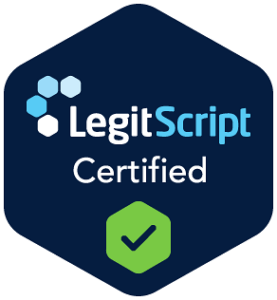
LegitScript Certified – Confirms that Tennessee Detox Center operates in full compliance with laws and regulations, and meets high standards for transparency and accountability in addiction treatment marketing.
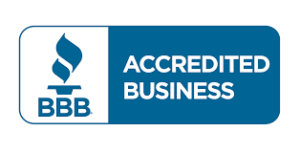
BBB Accredited – Demonstrates ethical business practices, commitment to customer satisfaction, and a trusted reputation within the community.
Psychology Today Verified – Indicates that Tennessee Detox Center is listed on Psychology Today, a trusted directory for verified mental health providers and treatment centers.
HIPAA Compliant – Ensures all patient health information (PHI) is protected and managed in accordance with strict federal privacy and data security standards.
ASAM Member – Tennessee Detox Center is a proud member of the American Society of Addiction Medicine (ASAM), reflecting a commitment to science-driven and evidence-based treatment standards.

Rutherford County Chamber of Commerce – Membership signifies active participation in the local community and support for regional growth and civic collaboration.
Get Family Support Now
Supporting Families Through Recovery
We understand addiction affects the whole family. Our comprehensive family program helps rebuild trust and restore relationships.
Weekly Family Therapy Sessions
Educational Workshops
Support Groups
Communication Skills Training









